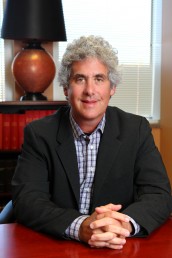UIC teams up with Brighton Park church to provide psychosocial support services to Mexican migrants
The University of Illinois at Chicago Center for Global Health has launched an initiative to provide psychosocial support to migrant families from Mexico who are members of the Immaculate Conception Parish on the Southwest side. The church, in the Brighton Park neighborhood, serves roughly 3,000 families, most of them migrant families from Mexico.
“Many migrants, especially those that are undocumented, don’t have access to mental health services, but they face unique challenges and stressors, especially if they are part of a mixed status family,” said Dr. Stevan Weine, professor of psychiatry in the UIC College of Medicine and director of the UIC Center for Global Health. “Migrants are more likely to face discrimination and violence, and many have symptoms of post-traumatic stress disorder, depression or anxiety. While many don’t have access to mental health services, they do have access to the church, so it is culturally synchronous to provide care for this population in the church.”
To fill the gap in access to mental health services, Weine and colleagues in the UIC department of psychiatry, and members of the Immaculate Conception Parish, worked together to develop a support program to families in the church struggling with stress, depression, anxiety and other mental health issues.
The program is called Fortaleciendo Mi Familia, which means ‘strengthening my family,’ and is based on a low-intensity psychosocial support program developed by Weine and colleagues that has been used with Bosnian and Kosovar refugee families. “The program teaches kids and their families how to care for themselves, for example, deep breathing to reduce your level of anxiety or stress,” said Weine. The program also draws on work by the World Health Organization which has helped advance migrant mental health programs throughout the world.
Weine and his colleagues are currently training lay members of the parish to lead group sessions made up of six to eight families including children above 12 years old. They anticipate the sessions will begin this winter. Lay leaders will engage families in a discussion about their challenges and stressors, and find strategies for managing stress and anxiety. These facilitators will also help families access resources, including those pertaining to migration and citizenship.
Families will be approached by lay trainees to gauge their interest in participating in the program. Those that do will attend three to four sessions over the course of about a month, with each session lasting about two hours.
“The idea is to give these families knowledge and skills that they can apply to their unique situations to help reduce stress and depression,” said Weine.
In the next three months, the parish aims to deliver the intervention to 50 families. They plan to evaluate the effectiveness of the program by following up with participants immediately after, and one month after the program ends.
“We hope that the program will be successful and that we will be able to expand it so that more migrants at this church and perhaps at others could also participate,” Weine said.

